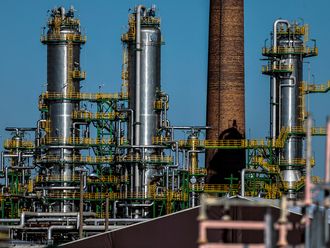London: For European investors trying to assess just how bad sentiment is right now, consider this: the last time stocks were this low, the region had just suffered its longest- ever recession and corporate profits were about to shrink a third year.
Signs of an improving economy haven’t deterred bears from punishing the Euro Stoxx 50 Index in a global rout, sending it to its lowest close since September 2013. It fell another 0.8 per cent at 8:37am in London.
Concerns ranging from oil to bad loans held by Italian banks have cast a shadow on the region’s recovery, with European stocks failing to lure bargain hunters even though they trade at their biggest discount in more than a year relative to US shares.
“There’s a huge disconnect between reality and perception,” said Luca Paolini, chief strategist at Pictet Asset Management in London. “Europe’s in a bear market when it has quantitative easing, decent valuations, earnings picking up and an improving economy.”
The pessimism is a far cry from where we were at the start of the year. Heading into 2016, strategists projected European equities would rally to a new high, and traders poured money into funds targeting the shares. A couple of weeks in, and market watchers lowered their expectations, though they still estimated the Euro Stoxx 50 would jump an annual 10 per cent.
What’s happened since are a deepening oil rout, intensifying concern over China’s slowdown and growing worries about the region’s lenders — the biggest decliners this year. Deutsche Bank AG, which posted its first loss since 2008, has plunged to a record, while Italy’s Banca Monte dei Paschi di Siena SpA has tumbled 58 per cent through Monday. The lender is seeking a buyer to shore up its finances and reported a quarterly loss.
Even expectations that the European Central Bank will step up support as soon as next month have done little to salvage stocks now down 27 per cent from a peak in April. While the Euro Stoxx 50 has been hovering near levels that chart analysts call oversold, no rebound has lasted longer than two days. The region’s equity gauge ended Monday trading at 12.2 times estimated earnings, more than 20 per cent lower than the valuation of the Standard & Poor’s 500 Index.
All of this is happening as economic data look better than they did three years ago. Economists predict the euro area will grow 1.6 per cent in 2016 and expanded 1.5 per cent in 2015, compared with the 0.3 per cent contraction of 2013. Analysts expect corporate earnings to rise 4.6 per cent in 2016, and the euro is about 15 per cent lower against the dollar than it was last time stocks were this low, which should be a boost for exporters.
Still, the rout has already taken about $6.8 trillion off global equities this year alone, and fund managers are shunning risk assets, increasing their cash allocation to the third- highest levels since 2009, according to a Bank of America Corp survey last month. Only 8 per cent of respondents said they expected the worldwide economy would strengthen in the next 12 months, the most bearish reading since 2012.
While the plunge is global, European shares are bearing the brunt of the sell-off. Seven of the world’s 10 worst-performing equity gauges this year are from western Europe, including a 16 per cent plunge in Germany’s DAX Index and losses of 23 per cent in Italy’s FTSE MIB Index. Greek stocks closed on Monday at their lowest levels since 1990.
“Bearish sentiment is close to extremes,” said David Hussey, head of European equities at Manulife Asset Management in London. “Markets do look oversold short term, so for long- term investors this can work. You can be ready to seize good opportunities and build positions into the weakness.”












